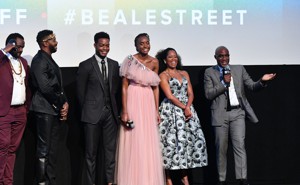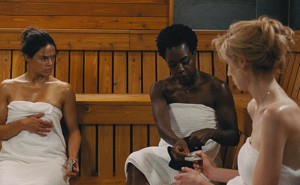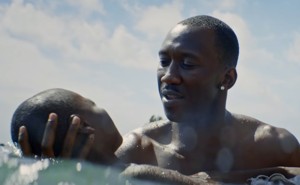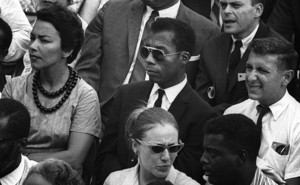Barry Jenkins on Making ‘If Beale Street Could Talk’ - The Atlantic
How Barry Jenkins Turned His James Baldwin Obsession Into His Next Movie
The If Beale Street Could Talk director discusses why his new film was harder to make than Moonlight, how he brought 1970s Harlem to life, and what kind of “chemistry” he wants between his actors.DAVID SIMSDEC 8, 2018
 Barry Jenkins directs KiKi Layne (right) on the set of his film If Beale Street Could Talk.TATUM MANGUS / ANNAPURNA PICTURES / THE ATLANTIC
Barry Jenkins directs KiKi Layne (right) on the set of his film If Beale Street Could Talk.TATUM MANGUS / ANNAPURNA PICTURES / THE ATLANTICThis interview contains some mild spoilers for the film If Beale Street Could Talk.
Two years after his paradigm-shifting Oscar success with Moonlight, the director Barry Jenkins is making a triumphant return with If Beale Street Could Talk, a delicate but devastating adaptation of James Baldwin’s 1974 novel of the same title. Set in 1970s Harlem, the film stars KiKi Layne and Stephan James as two young lovers named Tish and Fonny, whose relationship is pulled apart after Fonny is falsely accused of rape and imprisoned. Jenkins handles the duo’s connection with the same poeticism and grace he’s displayed in his other work. He translates Baldwin’s prose with an ease that’s surprising, given that this is the first fictional film based on one of the author’s novels.
Ahead of the movie’s release, The Atlantic spoke with Jenkins about why this film was so much harder to make than Moonlight, how he brought the particular lushness of Harlem to life, and why he thinks of Beale Street as Baldwin’s take on a Law & Order episode. This interview has been edited for length and clarity.
David Sims: I know you’ve loved the novel for a long time, but when did it occur to you that it’d be possible to adapt it?
Barry Jenkins: I think because I never expected that we’d actually get to make it, a lot of the more pressure-filled aspects of it weren’t there. At literally the same time that I wrote Moonlight, I wrote this. Back in 2011, 2012, I was in this thing I called “filmmaker therapy.” I had been at a program in New York City—this company called Cinereach does this thing called the Cinereach Fellowship. So I would come out from San Francisco every two months, sit on the couch at Cinereach, and spill my guts out to the advisers. I was talking about James Baldwin a lot and how obsessed I was with him, and I think it was Natalie Difford at Cinereach who said, “Why don’t you try adapting him?”
And a friend of mine had sent me Beale Street and said, “You should make a film of this.” And in the swirl of all these things, I said, “All right, I’m gonna go off to Europe and I’m gonna try and adapt this.”
MORE STORIES

Barry Jenkins Brings James Baldwin Home to HarlemHANNAH GIORGIS

The Trenchant Powers of If Beale Street Could Talk and WidowsDAVID SIMS

Moonlight Is a Film of Uncommon GraceDAVID SIMS

The Imperfect Power of I Am Not Your NegroDAGMAWI WOUBSHET
Sims: When does it happen that this is no longer an exercise, that this is something you’d be interested in? Because the Baldwin estate is very protective of his work.
Jenkins: Very protective and very diligent. I finished the first draft in 2013, went directly to Telluride, started rewriting it a bit with the help of my producers. And then in the spring of 2014, I sent it to the Baldwin estate, and right away I got a typewritten letter in the mail saying, “We’ve received your package.” Then it was this slow process of the people watching my first film, Medicine for Melancholy, passing around the hard copy of my script, and it was somewhere in early preproduction on Moonlight where I realized, Oh, they’re taking this seriously. I think this is going to happen.
Read: “Moonlight” is a film of uncommon grace.
Sims: When you’re trying to adapt Beale Street, is there anything that strikes you as the root of this story? Because I reread the book and this line stuck out to me. Tish talking about Fonny: “It’s a miracle to realize that somebody loves you.” When I saw the movie, that jumped out to me as the keystone of the film.
Jenkins: The purity of the love between them is definitely something that grabbed me. Baldwin had a few voices that he wrote in, and one of those voices was just deeply sensual, innately in touch with human emotions. But also he could be a very, very angry social critic. And I think this book is the perfect fusion of the more essayistic protest novel and somebody who deeply believed in sensuality and love. When I first read the book, or second-read the book, I thought, How amazing would it be to fuse those two things into a cinematic language?
Sims: But challenging, right?
Jenkins: Definitely challenging. This movie was definitely harder than Moonlight. For 8,000 different reasons, but the narrative is slippery, there are way more characters. If there are five words spoken in Moonlight, there are 500 words spoken in Beale Street. There are all these different muscles that I haven’t had to work out in the past that I had to work out in this film.
Sims: And you have a voice-over narrator. Was that there from the very beginning?
Jenkins: From the very beginning. As somebody who grew up being obsessed with Wong Kar-wai, I’ve always been attracted to narratives that feature voice-over. Part of that is—and I’ve said this in the past—I don’t think cinema is the best medium for interiority. In cinema, everything has to be acted out in flesh and blood. In film school, our professors were like, “Voice-over is a trope; it’s a crutch.” So I always wanted to find a way to defy those teachings. I think when done well, like in the hands of Wong Kar-wai, it can be incredibly evocative. And Baldwin is one of the premier writers of the interior voice.
Sims: Between the intimacy and the polemical, when you’re thinking about the intimacy first, how do you approach that visually?
Jenkins: The visual current between Moonlight and Beale Street, that’s the place where they’re most similar. The intimacy between the two young persons, and for me that all came down to two actors who would connect in a certain way. I think when you think of chemistry, you think, Oh, those two actors just want to tear each other’s clothes off. And that’s not what I’m speaking of when I speak of chemistry. I’m talking about two people who feel legitimately connected, whose viewpoints and thoughts dovetail, and I thought that about KiKi Layne and Stephan James.
Beyond that, it was about trying to build a narrative, because the thing about this book to me that’s kind of shocking is, it’s James Baldwin writing a thriller. Or James Baldwin at least writing a procedural. Like if James Baldwin was going to write the pilot of Law & Order, this is what it would be. It was about taking care of that story while also allowing for the space to drift out of that and preserve these intimate elements. To not let the polemic overshadow the pristine housing of that intimacy.
Sims: The film has these shots of an actor looking right at the camera. Was that something you always had in mind, too? That was something that felt connected to Moonlight.
Jenkins: It’s funny, with Moonlight we didn’t plan to do those shots. We kind of had this idea in the back of our head, and then we just kinda started doing them. With Beale Street we knew, but we didn’t know when we would use them. It’s an easy thing for [the cinematographer James Laxton] and I to set up, and what I like to do is, if I can feel that the actor’s in a place where the thinking has receded and they’re in a meditative state, then we pull that shot out. It’s important for the audience to have a direct connection to the character, and when an actor’s performing, there’s always some degree of distance. If the performance goes away, and there’s this perfect fusion between actor and character, then I want the audience to look right into that person’s eyes.
Sims: Does it frighten the actors? Frighten is too strong, maybe, but unsettle?
Jenkins: Frighten is too strong, but it’s awkward. KiKi Layne, who plays Tish, had the most wonderful observation about it. She said, “This is awkward as hell.” And in my head, I thought, Oh, she’s just inexperienced, that’s why it’s so awkward. And then she broke it down and said, “No, when you’re acting, there’s giving and receiving. You’re in the scene with the other actor, you give and they respond. When you’re looking in the lens, you’re just giving and there’s nothing coming back.” And I was like, “Oh, shit, when you put it that way, I understand.” And then I said, “You don’t know this, but you’re giving to the audience. And trust me, they are giving things back.”
Sims: So that connection is important. For the polemical, the message of the book, that feels even harder to wind in.
Jenkins: It was, and it wasn’t. One of the many smart things about this book is Baldwin could have written about this in purely essayistic form. It could have been a sequel to The Fire Next Time had he so chosen. But the most heightened polemic are the two conversations between black men because it’s coming through the body of actors who can identify with the things that Baldwin is speaking through these characters. I think it comes out in this way that feels completely natural and quite organic. Because of that, I think the punches land.
For me, the difficulty in that was the casting. Because Baldwin was amazing, but he was also singular. Sometimes the characters are speaking and it’s not the characters; it’s James Baldwin. But with these actors, they take that language and make it fully whole. For me, once the cast was collected and put together, and they all love the material, you just push the button.
Sims: You’ve made three movies that have a palpable connection to their place. The Harlem of this movie feels real but a little—magical isn’t the word, but part of the past. How did you want to put Harlem on the screen?
Jenkins: I thought the book was a love letter to Harlem in a certain way. I thought nobody can love a place more than someone who’s writing from the inside. I think Baldwin very much wrote from the inside. Because Harlem in this period was a very limiting place. And yet I love how in the book, Tish feels safer and more at home in Harlem than she does in the Village. What I saw in that was Harlem as this place where these characters can feel loved, where this love will be allowed to flourish. Look, it’s Baldwin. It’s not sleight of hand; it’s not surprising that while Harlem is the place the NYPD would say was a hub of crime, Tish and Fonny go down to the Village and that’s where all the problems start.
I had spent some time in Harlem, had read a lot about the place from afar. I had a very idealistic view of what the place was, and what it meant for the cultural identity of African Americans. When you read the book, it feels like a celebration of life and the lushness of the romance Baldwin depicted.
Read: Barry Jenkins brings James Baldwin home to Harlem.
Sims: And the colors are so vivid, versus the scenes in the Village, which are very dark and the lights feel a little harsher. Is that how you wanted to differentiate the two places?
Jenkins: That was part of it. The other part of it was, just like with Moonlight, I think the tone of certain sequences are affected by the emotion of the narrative. In prison, the light is a little harsher as Tish and Fonny’s relationship starts to curdle.
Sims: Tish is obviously the character anyone is going to connect to watching it. Fonny is tougher because he’s behind a glass wall for so much of the movie.
Jenkins: It’s honestly why Stephan James booked the part. I knew I wanted to play it straight—there are a couple of moments where Fonny has these flashes of anger, as he should.
Sims: And he knows it frightens Tish, as well.
Jenkins: I wanted an actor whose presence was so large that, as you said, even through these barriers of glass, and through the burden of whatever doubt the audience might have, he can still express his full self. I’m not comparing Fonny or Stephan James to Barack Obama, but I think about how angry Barack Obama must have been so many times during his presidency. He had to shave off so many parts of himself. And I didn’t want to do that with this character. So Stephan was someone who I knew could bring the full range of his character. And he just has the most amazing eyes. We didn’t plan to do the dissolves we do in the film, but there were a few shots just looking into his eyes, and I knew we had to get out of the scene, but I just wanted to hold on to the eyes a little bit longer.
Sims: This movie could have been so fiery and angry. Fonny’s situation is so Kafkaesque—he knows he was far from the crime scene, but you don’t even let us see where he actually was.
Jenkins: Because I think that would be too easy. Tish does that whole monologue that it’s not possible to run from Orchard to Bank Street. We could very easily show that. It’s not in the book, but—what do you think? There’s a preponderance of evidence. And also, you’ve seen this man; you’ve been watching him.
Sims: It gets back to the polemical thing. The movie doesn’t want to communicate anger so much as hopelessness.
Jenkins: If it’s all anger, all the time, then to me that’s dehumanizing in a certain way. I think in reading the novel, I could feel the anger. I think we keep some of that anger; I think the angriest bits of the novel, we don’t need to lean in to. But what moved me about the novel was that anger never completely consumed or overwhelmed the love, the community, the family. For me to have made it from a point of Fuck this, fuck everything, that would have almost—tainted is the wrong word, but it would have affected the depictions of their love. There is a child at the end of this journey, and I did not want to have the circumstances of what befalls Fonny to completely consume him.
Sims: To define this kid before he’s even born.
Jenkins: It’s interesting. Because the way we end this movie is different than the book, you can argue that it has [defined him]. One of the things I’m proudest of in the film, that I found most moving about the book … is the way Baldwin treats the character Victoria Rogers, the woman who has accused Fonny of rape. You read the book, and you know she’s not the antagonist; she is a victim. And I love the way all the women—
Sims: They never say, “It didn’t happen.”
Jenkins: Exactly. And I even love that in the movie, when Regina [King’s character, Sharon, Tish’s mother] goes to Puerto Rico [to confront Victoria about her accusation against Fonny], if I were making this movie from a place of anger, the scene between the two of them would be very problematic. Because if she went to confront that woman out of anger or bitterness … it frightens me to think of how that scene could have played out.
Read: The trenchant powers of “If Beale Street Could Talk” and “Widows”
Sims: Making this movie in 2018, that scene seems like the toughest needle to thread.
Jenkins: There’s a scene very early in the film where there’s an act of domestic violence. Right in the moment, you hear Joseph, Colman Domingo’s character [and Tish’s father], say, “Don’t hit your woman” [to Fonny’s father]. Then Sharon says, “Go on, we don’t need you here,” and sends the men out. The very first thing she does is go right to the door and turn the deadbolt so the men can’t come back in. The men are out there; the women are in here. Now [the women in Tish and Fonny’s families] still have it out, but just as a common denominator, woman to woman, [the message is] I’m going to protect you.
Sims: And as they have it out, it’s a woman-to-woman conversation; they’re talking about one another as mothers.
Jenkins: Exactly. So despite the fact that Sharon is there [with Victoria] talking about Fonny, I wanted that scene to also play as woman to woman—I am not here to judge you, I am not here to attack you; I am here to talk to you. It is in the book, but as the conversation is starting to slip away, [Sharon] refers to her as “daughter.” And Emily Rios [who plays Victoria] is so good in the role. You see something flinch because she’s thinking, This woman is not here to attack me. But there’s trauma, and there’s no place for trauma to go but out. Someone described it to me as Regina being like Jeremy Renner in The Hurt Locker, sitting there trying to defuse the bomb and she cuts the wrong damn wire.
Sims: You also give the image of Fonny working on the wood, making his art, special treatment.
Jenkins: For me, talking about Baldwin’s language, I always loved that the book [includes the passage]: Fonny’s working on the wood, it’s a very soft wood, he doesn’t want to defile the wood. It reminded me of making movies. At the point where he’s doing this, he’s at the lowest of lows, in prison. I thought, I want to see this guy work, but the work needs to have an almost heightened quality to it. He’s in this place where he doesn’t have access to sunlight. His flat is a basement apartment. So let’s take the roof off the set and just blast the sun into his workspace.
Sims: To bring it back to Wong Kar-wai, In the Mood for Love has these wordless scenes with the characters carrying noodles, and it always felt like the movie was dancing, almost like waltzing with the audience. That’s how I felt about the woodworking scene.
Jenkins: And by that point, you know the story, you know the characters. It is okay to waltz at that point.
Sims: Baldwin talks about how the work keeps Fonny sane, and keeps him safe.
Jenkins: “He had found his center.”
We want to hear what you think about this article. Submit a letter to the editor or write to letters@theatlantic.com.

DAVID SIMS is a staff writer at The Atlantic, where he covers culture.
TwitterEmail
MOST POPULAR
No comments:
Post a Comment